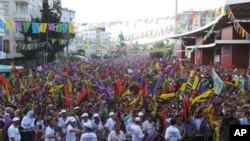Thousands turned out at a Sunday rally in Istanbul to hear Selahattin Demirtas, leader of the pro-Kurdish People’s Democracy Party (HDP), campaign for president.
Addressing the crowd with calls for peace, inclusiveness and democracy, Demirtas, analysts say, has mastered the skill of holding together rival factions of the pro-Kurdish movement.
A charismatic and skilled politician, the 41-year-old has reaching beyond his usual voting base, leading some analysts to think his campaign could affect outcome of the first-round vote on August 10.
According to Sinan Ulgen of the Brussels-based Carnegie Institute, although opinion polls put Demirtas far behind the two other candidates, his ability to reach an unusually broad swath of the Turkish electorate — his campaign has been resolutely focused on a message of inclusiveness and warnings against sectarian divides — he may have a particularly adverse impact on Prime Minister Recep Tayyip Erdogan's presidential bid.
Erdogan is seeking to win the presidential election outright in the first round with 50 percent plus one of the votes.
If no candidate achieves this, a run-off election will be held two weeks later.
"The Kurdish vote will be important for Erdogan," said Ulgen. "Selahattin Demirtas is a good candidate, and therefore in the first round the Kurdish vote is likely to go to their own candidate. So Erdogan will not be able to get as high a Kurdish vote as he would like."
Ekmeleddin Ihsanoglu, Erdogan's chief rival, is backed by the main opposition center-left Republican People’s Party and the far right National Action Party.
"Problems of sectarianism in Iraq and Syria also exist here, and the prime minister is paving the way for more divisions," Demirtas told the crowd on Sunday, adding that he although stands for greater human humans, along with advocating expanded rights for women and workers, the danger of sectarian division poses the biggest threat.
Polls show Demirtas could take around 10 percent of the vote, higher than his party's usual six percent. But the candidate is handicapped by limited financial resources and restricted media exposure. According to official figures in the first few days of the campaign, Turkey's state broadcaster gave him a few minutes of air time compared with over 300 minutes for Prime Minister Erdogan.
Demirtas on Sunday mocked the state broadcaster for its "fair and scrupulously unbiased coverage," and the sarcasm went viral on Turkish social media. For Turkish campaign politics, it's viewed by many as a fresh approach.
"It's important to vote for Demirtas because he is fighting for democracy and human rights for everyone," said one Turkish student at the rally, who spoke on the condition of anonymity. "He will represent all sections of society."
With s strong following among the young, analysts say Demirtas may be able attract some of those who participated in last year’s anti-government protests known as the Gezi movement.
Demirtas's HDP party has been struggling to be seen as more than just an ethnic and human rights movement. If his campaign secures a significantly higher than usual vote for the party — and if it secures votes beyond traditionally pro-Kurdish areas — some analysts think the campaign may achieve a historically important step across Turkey's ethnically defined electoral divide.




